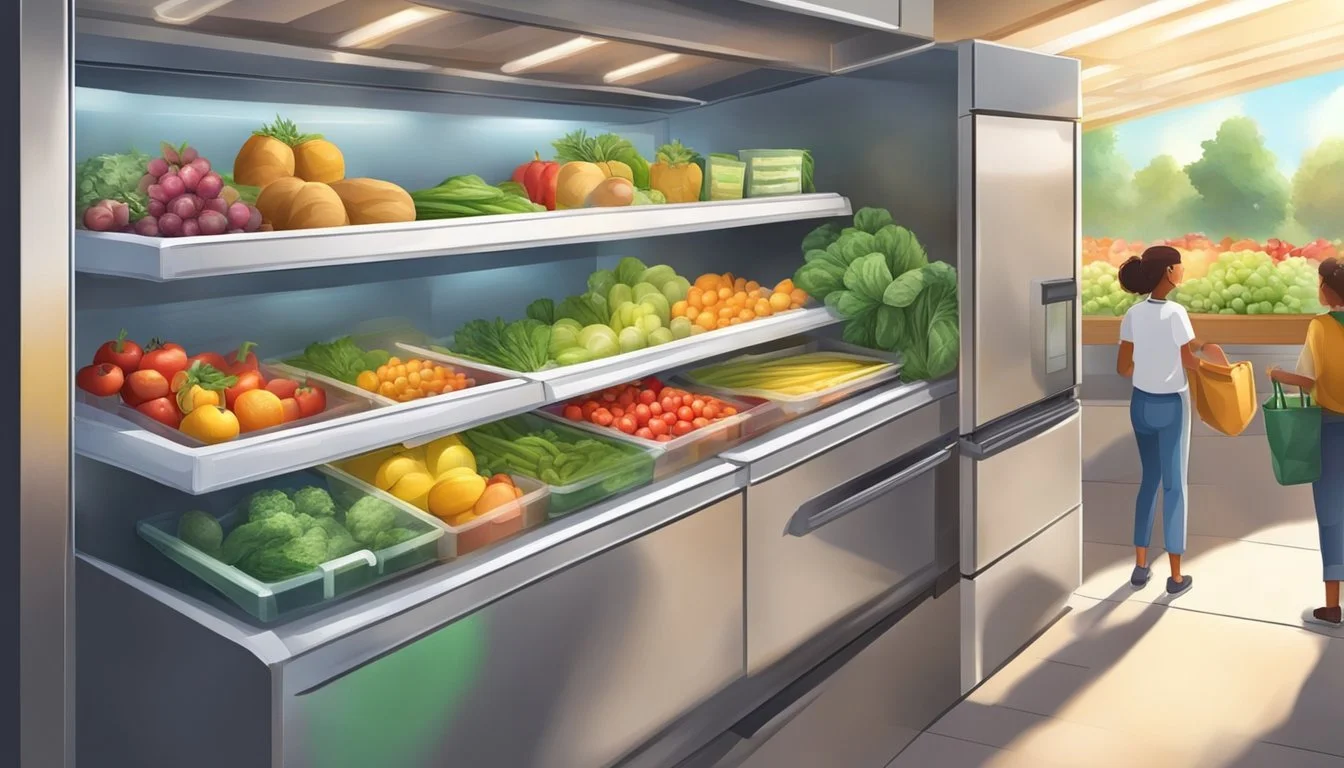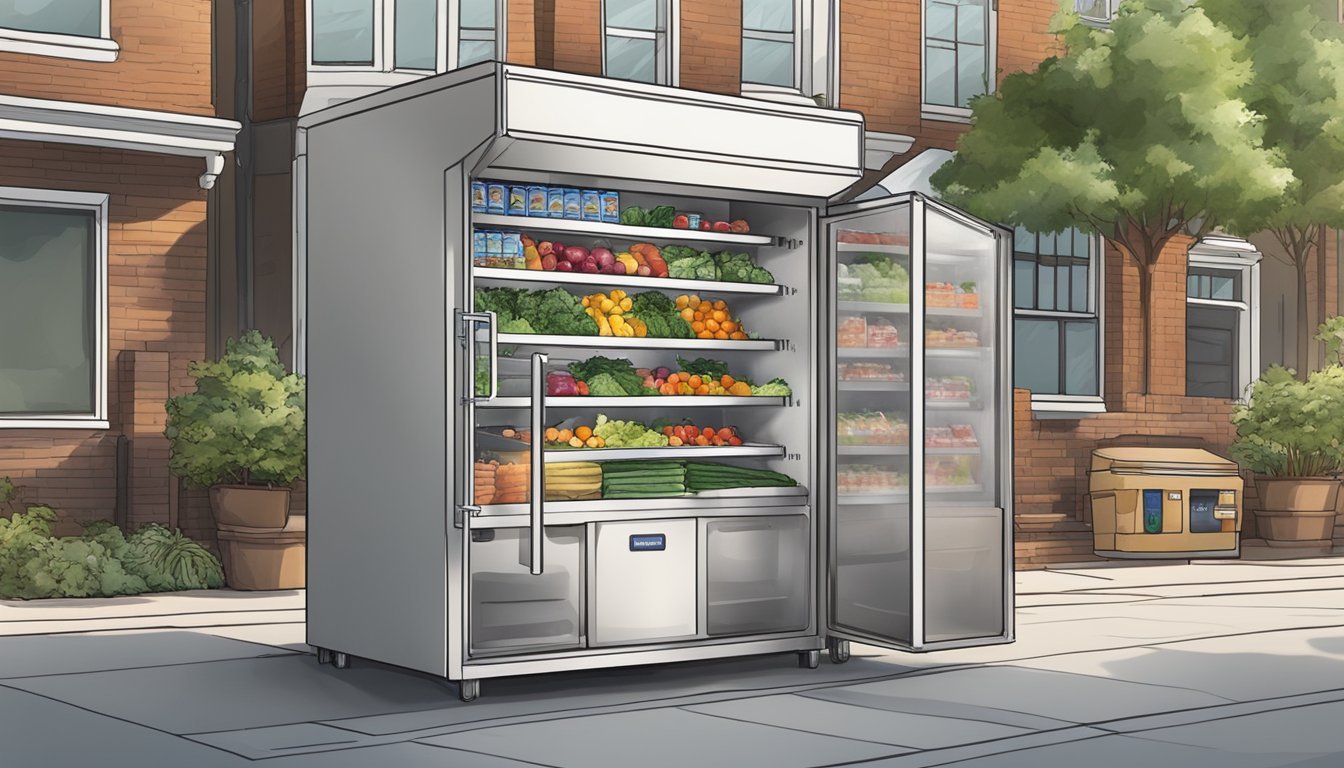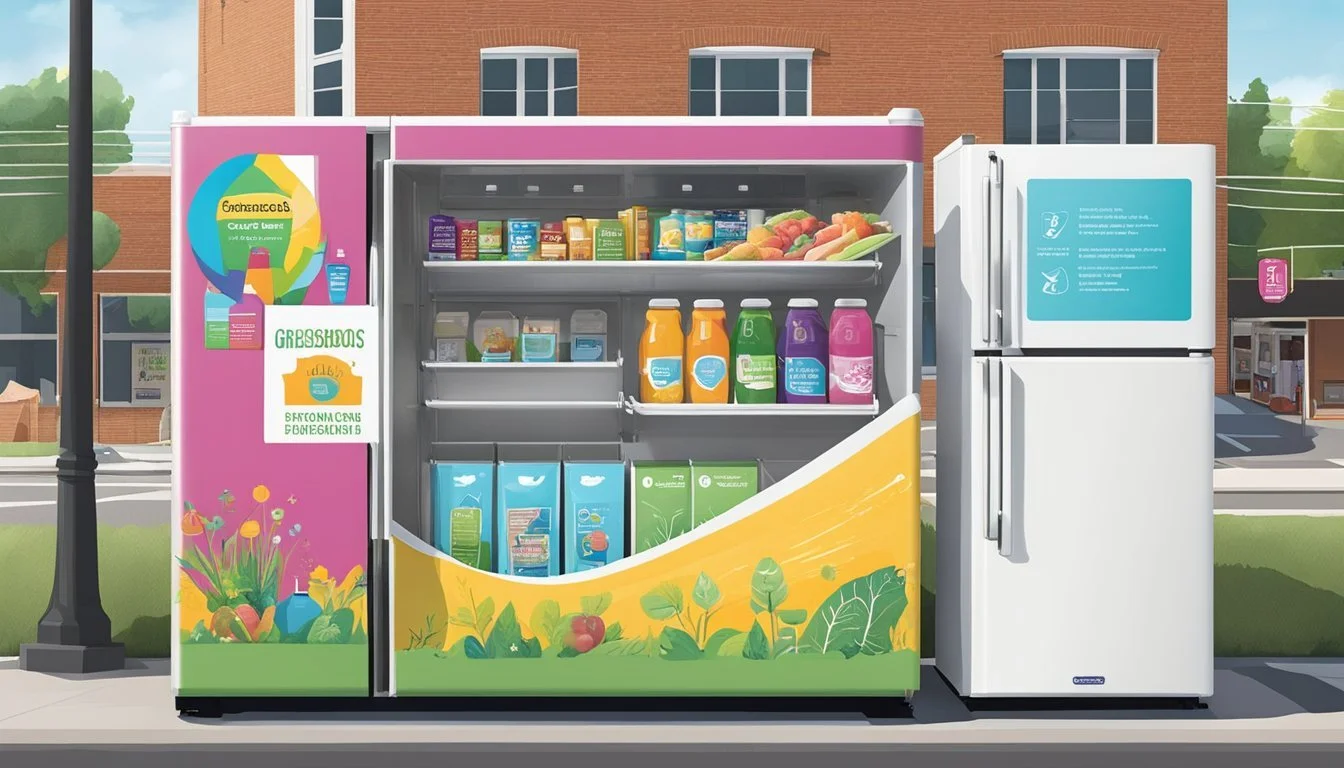Greensboro, NC Community Fridge
Nourishing Neighborhoods Together
In Greensboro, North Carolina, an innovative initiative has taken root in the form of community fridges. These refrigerators, accessible to all, are strategically placed in various neighborhoods to alleviate food insecurity and provide residents with fresh produce and food items. Grounded in the principle of mutual aid, these fridges offer a novel approach to address the challenges of food scarcity in urban areas.
The Greensboro Community Fridge operates as a beacon of support, epitomizing a collaborative spirit among locals. By allowing community members to donate food or take what they need without cost, the initiative fosters a sense of solidarity and empowerment. Its presence underlines a commitment to creating a sustainable solution for those facing the immediate daily struggles of hunger and contributes to the larger goal of ending food apartheid in the region.
About Greensboro Community Fridge
Greensboro Community Fridge is a pivotal initiative combating food insecurity by offering round-the-clock access to free food. The project exemplifies the spirit of mutual aid within Greensboro, empowering communities with resources to tackle hunger.
Origins of the Project
The project originated as a response to the pressing need within several Greensboro neighborhoods. It started with the single goal of addressing food scarcity in areas like Warnersville. The concept of the community fridge is rooted in a mutual aid framework, relying on the collective contributions and management by local residents and volunteers.
Importance to Greensboro
For the city of Greensboro, the community fridge serves as more than just a source of free produce. It has become a symbol of the community's resilience and dedication to caring for its most vulnerable residents. By providing healthy food options with no socioeconomic restrictions, they ensure that every individual has the dignity of food security. The fridge’s location in communities like Warnersville allows it to serve residents who are in immediate need, fostering a sense of togetherness and support that is central to the ethos of King's legacy in mutual aid.
How the Fridge Works
The community fridge in Greensboro operates as a nexus point for providing fresh food to those in need, with a focus on maintaining the quality and safety of perishable goods.
Setting Up the Fridge
The installation process for a community fridge involves finding a centrally located, accessible area where the public can easily reach it. In Greensboro, the Freedom Fridge is stationed outside the Prince of Peace Lutheran Church. The fridge is connected to a power source to ensure a consistent operating temperature for food safety. A simple shelter may also be constructed to protect the refrigerator from the elements and to keep the equipment running efficiently.
Managing Perishable Goods
To ensure the fridge provides maximum benefit to the community:
Perishables: The community fridge is regularly stocked with fresh food items. These could include fruits, vegetables, dairy, and other perishable goods that require refrigeration.
Non-Perishables: The pantry section might contain non-perishable items that don't need refrigeration, including canned goods, rice, and pasta.
Strict guidelines are observed in managing the stocking and rotation of goods to prevent spoilage and ensure food safety. Community members are encouraged to take what they need and donate what they can, creating a sustainable cycle of support. Volunteers are pivotal in monitoring the state of the stock, cleaning the refrigerator, and ensuring that the community fridge remains a reliable resource for fresh and nutritious food.
Community Involvement
Community involvement is a pivotal aspect of the Greensboro Community Fridge, fostering a supportive environment through hands-on participation and partnerships that ensure its ongoing success and reach.
Volunteer Opportunities
Volunteers are integral to the operations of the Greensboro Community Fridge. There are various individual service opportunities for community members to sign up and contribute their time. They can assist with regular fridge maintenance, food stocking, and organization. Interested individuals can find sign-up options through platforms like GivePulse, where they can also track and verify their volunteer hours. Using a simple Google Form, prospective volunteers can easily express their interest and availability.
Contributing Partners
The backbone of the Greensboro Community Fridge is the partnership with local organizations, businesses, and charities. These contributing partners offer resources ranging from food donations to logistical support. Key players include Prince of Peace Lutheran Church and regional food aid networks that collaborate to tackle food insecurity. Through partnerships, the initiative not only receives vital support but also gains visibility within the Greensboro community, enhancing its impact and sustainability.
Addressing Food Insecurity
In Greensboro, North Carolina, community efforts are actively addressing the overlap between food insecurity and food waste, providing much-needed resources to those in need through innovative solutions such as community fridges.
Alleviating Hunger
Community fridges in Greensboro are a direct response to the pressing issue of hunger in the area. These fridges are stocked with fresh produce and other food items, allowing individuals who face food insecurity to have equal access to nutritious meals. The project Fighting Hunger in NC, driven by Greensboro Community Fridge, is a major force behind this movement. They collaborate with various organizations and local donors to keep the fridges replenished.
Locations: The initiative has strategically installed fridges in areas with known food scarcity.
Impact: By providing 24/7 access, they ensure no one is left without basic sustenance.
Food Donation Guidelines
When it comes to food donations, the Greensboro community abides by well-defined safety and quality standards to protect both recipients and donors. According to the Food Recovery Program by A Simple Gesture Greensboro and NCSU Food Safety Extension Program, all donated items must meet the following criteria:
Safety: Food must be handled according to state-supported Standard Operating Procedures to ensure safe consumption.
Pantry Needs: Donations are vetted to coincide with pantry needs, avoiding unnecessary waste.
Verification: Volunteer hours can be verified through platforms like Give Pulse to ensure accountability and transparency.
Accepted Materials: Only items that comply with the liability guidelines, like non-perishable goods and foods within their use-by date, are accepted.
Type of Donation Criteria Prepared Meals Must be dated and labeled properly Fresh Produce Should be in good condition, free from spoilage Non-perishables Sealed and within the best before date
By adhering to these structured guidelines, Greensboro's nonprofit organizations manage to turn food surplus into an opportunity to feed the hungry, while maintaining a high standard of food safety and reducing overall food waste.
Contribution Specifics
In this section, readers will learn what specific items the Greensboro Community Fridge accepts and how these donations are best organized within the fridge.
What to Donate
The Greensboro Community Fridge encourages community members to donate a variety of food items to assist those facing food insecurity. A priority is placed on fresh produce and meat, ensuring recipients have access to nutritious and balanced options. Additionally, donors are requested to provide non-perishable goods such as peanut butter, jelly, canned stews, and chili which offer longer shelf stability.
Donations should include:
Beverages: Tea bags, coffee, juice boxes, canned juices
Grains & Cereals: Rice, hot and regular cereals, packaged pasta
Canned Goods: Fruit, pasta, beans, gravy
Baking Essentials: Granulated sugar, cake mixes, pancake mix, syrup
Baby Needs: Baby food, baby formula
Snacks: Granola bars, cereal bars
Other acceptable items are powdered milk and syrup to support versatile meal preparation.
Organizing Food Items
Efficiency and hygiene are key when organizing food within the community fridge. Donors should ensure that all meat is stored properly, typically on the bottom shelf, to prevent cross-contamination. Fresh produce should be visible and within easy reach, ideally placed on higher shelves. Non-perishable items like canned goods and cereals ought to be grouped by category and neatly arrayed to facilitate easy selection by those in need.
To maintain a helpful organization:
Keep meats separate and on the lowest shelves
Place fresh produce at eye level
Group similar items together, such as baby products in one area
Ensure all donated items are within the expiration date and suitable for consumption
By adhering to these specifics, the Greensboro Community Fridge operates smoothly and continues to serve as a valuable resource for the local community.
Outreach and Education
The Outreach and Education initiatives led by the Greensboro Community Fridge are key to its success. They depend on a robust partnership network and adapt to the evolving needs of the community.
Social Media Channels
Instagram serves as a primary platform for the Greensboro Community Fridge, under the handle @gso_mutual_aid and @gsocommunityfridge. Here, they share updates and engage with the community through posts and stories. Users can directly message (DM) the organization through Instagram to inquire about services or volunteer opportunities.
Community Engagement
Greensboro Community Fridge emphasizes direct community engagement. They invite local residents to partner with them and contribute in various ways:
Email: Potential partners and volunteers can contact Outreach and Education staff—such as Paula Washington—by organization email to learn more about collaboration opportunities.
Phone: Stakeholders can also call at a provided number, such as 336-373-7878, to discuss engagement and support.
Their approach is dynamic, hence consistently aligning activities with community needs, ensuring that their outreach efforts are both strategic and effective.
Key Figures and Organizations
The Greensboro community fridge initiative is bolstered by key individuals and organizations working together to reduce food insecurity and minimize food waste. Their collaborative efforts are central to the program's success.
Notable Contributors
Alyzza May: A prominent advocate for addressing food insecurity.
Greensboro Community Fridge: The central entity around which the initiative is structured.
Institutional Support
Prince of Peace Lutheran Church: Provides location support for the Freedom Fridge.
GSO Mutual Aid: Collaborates with Greensboro Community Fridge in efforts against hunger.
Companies (Enfamil & Similac): They may provide product donations, although specific partnerships are not detailed in the provided information.
Future Prospects
The Greensboro Community Fridge initiative is poised for growth, with clear plans for expansion and a commitment towards employing sustainable practices in their operations.
Expansion Plans
The Greensboro Community Fridge, a mutual aid project, has outlined a goal to extend its reach beyond the current locations. Expansion efforts are underway to establish more fridges in various parts of the Triad and extend throughout the state of North Carolina. This plan is set to address food insecurity in more communities by providing easier access to fresh food.
Target Areas: New communities within the Triad and statewide
Collaborations: Partnerships with local organizations and churches
Infrastructure: Installation of additional community fridges with regular stocking
Detailed plans include leveraging existing partnerships and forming new collaborations, specifically aiming to utilize public spaces such as community centers and areas adjacent to charitable kitchens.
Sustainable Practices
Sustainability is at the core of the Greensboro Community Fridge's mission. Initiatives to minimize food waste and ensure continuous operation are prioritized.
Reducing Food Waste: Collaborating with local kitchens to redistribute surplus food
Energy Efficiency: Using fridges with low energy consumption
Community Involvement: Engaging volunteers for maintenance and stocking
The project places emphasis on responsible sourcing of produce and environmentally-friendly appliances to maintain its commitment to the planet while serving the community.









